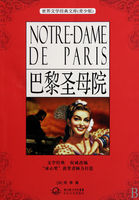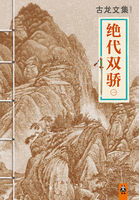If the reader, after having contemplated this lively and noisy scene which is being enacted in all parts of the Place, will now transfer his gaze towards that ancient demi-Gothic, demi-Romanesque house of the Tour-Roland, which forms the corner on the quay to the west, he will observe, at the angle of the front, a large public breviary, with rich illuminations, protected from the rain by a little penthouse, and from thieves by a small grating, which, however, permits of the leaves being turned. Beside this breviary is a narrow, arched window, closed by two iron bars in the form of a cross, and looking on the square; the only opening which admits a small quantity of light and air to a little cell without a door, constructed on the ground-floor, in the thickness of the walls of the old house, and filled with a peace all the more profound, with a silence all the more gloomy, because a public place, the most populous and most noisy in Paris swarms and shrieks around it.
This little cell had been celebrated in Paris for nearly three centuries, ever since Madame Rolande de la Tour-Roland, in mourning for her father who died in the Crusades, had caused it to be hollowed out in the wall of her own house, in order to immure herself there forever, keeping of all her palace only this lodging whose door was walled up, and whose window stood open, winter and summer, giving all the rest to the poor and to God.The afflicted damsel had, in fact, waited twenty years for death in this premature tomb, praying night and day for the soul of her father, sleeping in ashes, without even a stone for a pillow, clothed in a black sack, and subsisting on the bread and water which the compassion of the passers-by led them to deposit on the ledge of her window, thus receiving charity after having bestowed it. At her death, at the moment when she was passing to the other sepulchre, she had bequeathed this one in perpetuity to afflicted women, mothers, widows, or maidens, who should wish to pray much for others or for themselves, and who should desire to inter themselves alive in a great grief or a great penance.The poor of her day had made her a fine funeral, with tears and benedictions; but, to their great regret, the pious maid had not been canonized, for lack of influence.Those among them who were a little inclined to impiety, had hoped that the matter might be accomplished in Paradise more easily than at Rome, and had frankly besought God, instead of the pope, in behalf of the deceased.The majority had contented themselves with holding the memory of Rolande sacred, and converting her rags into relics.The city, on its side, had founded in honor of the damoiselle, a public breviary, which had been fastened near the window of the cell, in order that passers-by might halt there from time to time, were it only to pray; that prayer might remind them of alms, and that the poor recluses, heiresses of Madame Rolande's vault, might not die outright of hunger and forgetfulness.
Moreover, this sort of tomb was not so very rare a thing in the cities of the Middle Ages. One often encountered in the most frequented street, in the most crowded and noisy market, in the very middle, under the feet of the horses, under the wheels of the carts, as it were, a cellar, a well, a tiny walled and grated cabin, at the bottom of which a human being prayed night and day, voluntarily devoted to some eternal lamentation, to some great expiation.And all the reflections which that strange spectacle would awaken in us to-day; that horrible cell, a sort of intermediary link between a house and the tomb, the cemetery and the city; that living being cut off from the human community, and thenceforth reckoned among the dead; that lamp consuming its last drop of oil in the darkness; that remnant of life flickering in the grave; that breath, that voice, that eternal prayer in a box of stone; that face forever turned towards the other world; that eye already illuminated with another sun; that ear pressed to the walls of a tomb; that soul a prisoner in that body; that body a prisoner in that dungeon cell, and beneath that double envelope of flesh and granite, the murmur of that soul in pain; —nothing of all this was perceived by the crowd.The piety of that age, not very subtle nor much given to reasoning, did not see so many facets in an act of religion.It took the thing in the block, honored, venerated, hallowed the sacrifice at need, but did not analyze the sufferings, and felt but moderate pity for them.It brought some pittance to the miserable penitent from time to time, looked through the hole to see whether he were still living, forgot his name, hardly knew how many years ago he had begun to die, and to the stranger, who questioned them about the living skeleton who was perishing in that cellar, the neighbors replied simply, “It is the recluse.”
Everything was then viewed without metaphysics, without exaggeration, without magnifying glass, with the naked eye. The microscope had not yet been invented, either for things of matter or for things of the mind.
Moreover, although people were but little surprised by it, the examples of this sort of cloistration in the hearts of cities were in truth frequent, as we have just said. There were in Paris a considerable number of these cells, for praying to God and doing penance; they were nearly all occupied.It is true that the clergy did not like to have them empty, since that implied lukewarmness in believers, and that lepers were put into them when there were no penitents on hand.Besides the cell on the Grève, there was one at Montfaucon, one at the Charnier des Innocents, another I hardly know where, —at the Clichon House, I think; others still at many spots where traces of them are found in traditions, in default of memorials.The University had also its own.On Mount Sainte-Geneviève a sort of Job of the Middle Ages, for the space of thirty years, chanted the seven penitential psalms on a dunghill at the bottom of a cistern, beginning anew when he had finished, singing loudest at night, magna voce per umbras, and to-day, the antiquary fancies that he hears his voice as he enters the Rue du Puits-qui-parle—the street of the“Speaking Well.”
To confine ourselves to the cell in the Tour-Roland, we must say that it had never lacked recluses. After the death of Madame Roland, it had stood vacant for a year or two, though rarely.Many women had come thither to mourn, until their death, for relatives, lovers, faults.Parisian malice, which thrusts its finger into everything, even into things which concern it the least, affirmed that it had beheld but few widows there.
In accordance with the fashion of the epoch, a Latin inion on the wall indicated to the learned passer-by the pious purpose of this cell. The custom was retained until the middle of the sixteenth century of explaining an edifice by a brief device inscribed above the door.Thus, one still reads in France, above the wicket of the prison in the seignorial mansion of Tourville, Sileto et spera; in Ireland, beneath the armorial bearings which surmount the grand door to Fortescue Castle, Forte scutum, salus ducum; in England, over the principal entrance to the hospitable mansion of the Earls Cowper:Tuum est.At that time every edifice was a thought.
As there was no door to the walled cell of the Tour-Roland, these two words had been carved in large Roman capitals over the window, —
TU, ORA.
And this caused the people, whose good sense does not perceive so much refinement in things, and likes to translate Ludovico Magno by“Porte Saint-Denis, ”to give to this dark, gloomy, damp cavity, the name of“The Rat-Hole.”An explanation less sublime, perhaps, than the other; but, on the other hand, more picturesque.
Chapter3 History of a Leavened Cake of Maize
At the epoch of this history, the cell in the Tour-Roland was occupied. If the reader desires to know by whom, he has only to lend an ear to the conversation of three worthy gossips, who, at the moment when we have directed his attention to the Rat-Hole, were directing their steps towards the same spot, coming up along the water's edge from the Chatelet, towards the Grève.
Two of these women were dressed like good bourgeoises of Paris. Their fine white ruffs; their petticoats of linsey-woolsey, striped red and blue; their white knitted stockings, with clocks embroidered in colors, well drawn upon their legs; the square-toed shoes of tawny leather with black soles, and, above all, their headgear, that sort of tinsel horn, loaded down with ribbons and laces, which the women of Champagne still wear, in company with the grenadiers of the imperial guard of Russia, announced that they belonged to that class wives which holds the middle ground between what the lackeys call a woman and what they term a lady.They wore neither rings nor gold crosses, and it was easy to see that, in their ease, this did not proceed from poverty, but simply from fear of being fined.Their companion was attired in very much the same manner; but there was that indescribable something about her dress and bearing which suggested the wife of a provincial notary.One could see, by the way in which her girdle rose above her hips, that she had not been long in Paris.—Add to this a plaited tucker, knots of ribbon on her shoes—and that the stripes of her petticoat ran horizontally instead of vertically, and a thousand other enormities which shocked good taste.
The two first walked with that step peculiar to Parisian ladies, showing Paris to women from the country. The provincial held by the hand a big boy, who held in his a large, flat cake.
We regret to be obliged to add, that, owing to the rigor of the season, he was using his tongue as a handkerchief.
The child was making them drag him along, non passibus Cequis, as Virgil says, and stumbling at every moment, to the great indignation of his mother. It is true that he was looking at his cake more than at the pavement.Some serious motive, no doubt, prevented his biting it, for he contented himself with gazing tenderly at it.But the mother should have rather taken charge of the cake.It was cruel to make a Tantalus of the chubby-checked boy.
Meanwhile, the three demoiselles were all talking at once.
“Let us make haste, Demoiselle Mahiette, ”said the youngest of the three, who was also the largest, to the provincial, “I greatly fear that we shall arrive too late; they told us at the Chatelet that they were going to take him directly to the pillory.”
“Ah, bah!what are you saying, Demoiselle Oudarde Musnier?”interposed the other Parisienne.“There are two hours yet to the pillory. We have time enough.Have you ever seen any one pilloried, my dear Mahiette?”
“Yes, ”said the provincial, “at Reims.”
“Ah, bah!What is your pillory at Reims?A miserable cage into which only peasants are turned. A great affair, truly!”
“Only peasants!”said Mahiette, “at the cloth market in Reims!We have seen very fine criminals there, who have killed their father and mother!Peasants!For what do you take us, Gervaise?”
It is certain that the provincial was on the point of taking offence, for the honor of her pillory. Fortunately, that discreet damoiselle, Oudarde Musnier, turned the conversation in time.
“By the way, Damoiselle Mahiette, what say you to our Flemish Ambassadors?Have you as fine ones at Reims?”
“I admit, ”replied Mahiette, “that it is only in Paris that such Flemings can be seen.”
“Did you see among the embassy, that big ambassador who is a hosier?”asked Oudarde.
“Yes, ”said Mahiette.“He has the eye of a Saturn.”
“And the big fellow whose face resembles a bare belly?”resumed Gervaise.“And the little one, with small eyes framed in red eyelids, pared down and slashed up like a thistle head?”
“'Tis their horses that are worth seeing, ”said Oudarde, “caparisoned as they are after the fashion of their country!”
“Ah my dear, ”interrupted provincial Mahiette, assuming in her turn an air of superiority, “what would you say then, if you had seen in'16 at the consecration at Reims, eighteen years ago, the horses of the princes and of the king's company?Housings and caparisons of all sorts; some of damask cloth, of fine cloth of gold, furred with sables; others of velvet, furred with ermine; others all embellished with goldsmith's work and large bells of gold and silver!And what money that had cost!And what handsome boy pages rode upon them!”
“That, ”replied Oudarde dryly, “does not prevent the Flemings having very fine horses, and having had a superb supper yesterday with monsieur, the provost of the merchants, at the H?tel-de-Ville, where they were served with comfits and hippocras, and spices, and other singularities.”
“What are you saying, neighbor!”exclaimed Gervaise.“It was with monsieur the cardinal, at the Petit Bourbon that they supped.”
“Not at all. At the H?tel-de-Ville.
“Yes, indeed. At the Petit Bourbon!”
“It was at the H?tel-de-Ville, ”retorted Oudarde sharply, “and Dr.Scourable addressed them a harangue in Latin, which pleased them greatly.My husband, who is sworn bookseller told me.”
“It was at the Petit Bourbon, ”replied Gervaise, with no less spirit, “and this is what monsieur the cardinal's procurator presented to them:twelve double quarts of hippocras, white, claret, and red; twenty-four boxes of double Lyons marchpane, gilded; as many torches, worth two livres a piece; and six demi-queues of Beaune wine, white and claret, the best that could be found. I have it from my husband, who is a cinquantenier, at the Parloir-aux Bourgeois, and who was this morning comparing the Flemish ambassadors with those of Prester John and the Emperor of Trebizond, who came from Mesopotamia to Paris, under the last king, and who wore rings in their ears.”
“So true is it that they supped at the H?tel-de-Ville, ”replied Oudarde but little affected by this catalogue, “that such a triumph of viands and comfits has never been seen.”
“I tell you that they were served by Le Sec, sergeant of the city, at the H?tel du Petit-Bourbon, and that that is where you are mistaken.”
“At the H?tel-de-Ville, I tell you!”
“At the Petit-Bourbon, my dear!and they had illuminated with magic glasses the word hope, which is written on the grand portal.”
“At the H?tel-de-Ville!At the H?tel-de-Ville!And Husson-le-Voir played the flute!”
“I tell you, no!”
“I tell you, yes!”
“I say, no!”
Plump and worthy Oudarde was preparing to retort, and the quarrel might, perhaps, have proceeded to a pulling of caps, had not Mahiette suddenly exclaimed, —“Look at those people assembled yonder at the end of the bridge!There is something in their midst that they are looking at!”
“In sooth, ”said Gervaise, “I hear the sounds of a tambourine. I believe 'tis the little Esmeralda, who plays her mummeries with her goat.Eh, be quick, Mahiette!redouble your pace and drag along your boy.You are come hither to visit the curiosities of Paris.You saw the Flemings yesterday; you must see the gypsy to-day.”
“The gypsy!”said Mahiette, suddenly retracing her steps, and clasping her son's arm forcibly.“God preserve me from it!She would steal my child from me!Come, Eustache!”
And she set out on a run along the quay towards the Grève, until she had left the bridge far behind her.In the meanwhile, the child whom she was dragging after her fell upon his knees; she halted breathless.Oudarde and Gervaise rejoined her.
“That gypsy steal your child from you!”said Gervaise.“That's a singular freak of yours!”
Mahiette shook her head with a pensive air.
“The singular point is, ”observed Oudarde, “that la sachette has the same idea about the Egyptian woman.”
“What is la sachette?”asked Mahiette.
“H?”said Oudarde, “Sister Gudule.”
“And who is Sister Gudule?”persisted Mahiette.
“You are certainly ignorant of all but your Reims, not to know that!”replied Oudarde.“'Tis the recluse of the Rat-Hole.”
“What!”demanded Mahiette, “that poor woman to whom we are carrying this cake?”
Oudarde nodded affirmatively.
“Precisely. You will see her presently at her window on the Grève.She has the same opinion as yourself of these vagabonds of Egypt, who play the tambourine and tell fortunes to the public.No one knows whence comes her horror of the gypsies and Egyptians.But you, Mahiette—why do you run so at the mere sight of them?”
“Oh!”said Mahiette, seizing her child's round head in both hands, “I don't want that to happen to me which happened to Paquette la Chantefleurie.”
“Oh!you must tell us that story, my good Mahiette, ”said Gervaise, taking her arm.
“Gladly, ”replied Mahiette, “but you must be ignorant of all but your Paris not to know that!I will tell you then, that Paquette la Chantefleurie was a pretty maid of eighteen when I was one myself, that is to say, eighteen years ago, and 'tis her own fault if she is not to-day, like me, a good, plump, fresh mother of six and thirty, with a husband and a son.However, after the age of fourteen, it was too late!Well, she was the daughter of Guybertant, minstrel of the barges at Reims, the same who had played before King Charles VII., at his coronation, when he descended our river Vesle from Sillery to Muison, when Madame the Maid of Orleans was also in the boat.The old father died when Paquette was still a mere child; she had then no one but her mother, the sister of M.Pradon, master-brazier and coppersmith in Paris, Rue Farm-Garlin, who died last year.You see she was of good family.The mother was a good simple woman, unfortunately, and she taught Paquette nothing but a bit of embroidery and toy-making which did not prevent the little one from growing very large and remaining very poor.They both dwelt at Reims, on the river front, Rue de Folle-Peine.Mark this:For I believe it was this which brought misfortune to Paquette.In'61, the year of the coronation of our King Louis XI.whom God preserve!Paquette was so gay and so pretty that she was called everywhere by no other name than“la Chantefleurie”—blossoming song. Poor girl!She had handsome teeth, she was fond of laughing and displaying them.Now, a maid who loves to laugh is on the road to weeping; handsome teeth ruin handsome eyes.So she was la Chantefleurie.She and her mother earned a precarious living; they had been very destitute since the death of the minstrel; their embroidery did not bring them in more than six farthings a week, which does not amount to quite two eagle liards.Where were the days when Father Guybertant had earned twelve sous parisian, in a single coronation, with a song?One winter, when the two women had neither fagots nor firewood, it was very cold, which gave la Chantefleurie such a fine color that the men called her Paquette!and many called her Paquette!and she was ruined.—Eustache, just let me see you bite that cake if you dare!—We immediately perceived that she was ruined, one Sunday when she came to church with a gold cross about her neck.At fourteen years of age!do you see?First it was the young Vicomte de Cormontreuil, who has his bell tower three leagues distant from Reims; then Messire Henri de Triancourt, equerry to the King; then less than that, Chiart de Beaulion, sergeant-at-arms; then, still descending, Guery Aubergeon, carver to the King; then, Mace de Frépus, barber to monsieur the dauphin; then, Thévenin le Moine, King's cook; then, the men growing continually younger and less noble, she fell to Guillaume Racine, minstrel of the hurdy gurdy and to Thierry de Mer, lamplighter.Then, poor Chantefleurie, she belonged to every one:she had reached the last sou of her gold piece.What shall I say to you, my damoiselles?At the coronation, in the same year, '61, 'twas she who made the bed of the king of the debauchees!In the same year!”
Mahiette sighed, and wiped away a tear which trickled from her eyes.
“This is no very extraordinary history, ”said Gervaise, “and in the whole of it I see nothing of any Egyptian women or children.”
“Patience!”resumed Mahiette, “you will see one child.—In'66, 'twill be sixteen years ago this month, at Sainte-Paule's day, Paquette was brought to bed of a little girl.The unhappy creature!it was a great joy to her; she had long wished for a child.Her mother, good woman, who had never known what to do except to shut her eyes, her mother was dead.Paquette had no longer any one to love in the world or any one to love her.La Chantefleurie had been a poor creature during the five years since her fall. She was alone, alone in this life, fingers were pointed at her, she was hooted at in the streets, beaten by the sergeants, jeered at by the little boys in rags.And then, twenty had arrived:and twenty is an old age for amorous women.Folly began to bring her in no more than her trade of embroidery in former days; for every wrinkle that came, a crown fled; winter became hard to her once more, wood became rare again in her brazier, and bread in her cupboard.She could no longer work because, in becoming voluptuous, she had grown lazy; and she suffered much more because, in growing lazy, she had become voluptuous.At least, that is the way in which monsieur the cure of Saint-Remy explains why these women are colder and hungrier than other poor women, when they are old.”
“Yes, ”remarked Gervaise, “but the gypsies?”
“One moment, Gervaise!”said Oudarde, whose attention was less impatient.“What would be left for the end if all were in the beginning?Continue, Mahiette, I entreat you. That poor Chantefleurie!”
Mahiette went on.















